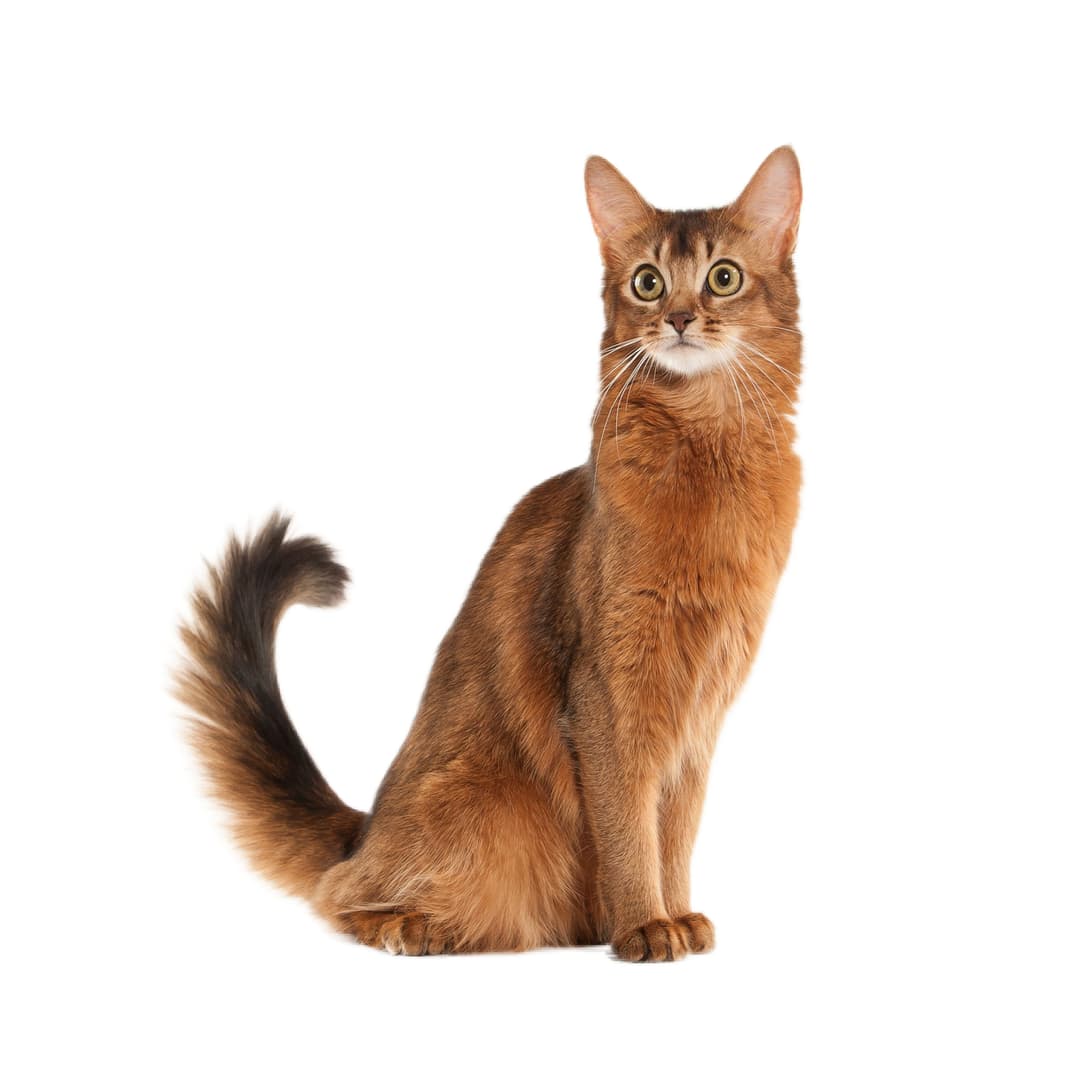Discover your cat's connection to this breed and 20 others


Discover your cat's connection to this breed and 20 others



The Somali cat has the beautiful features of the Abyssinian, but with locks that are longer and more luscious! The Somali shares the Abyssinian's ticked coat pattern, also known as agouti, in shades of ruddy, red, fawn, cinnamon, lilac, and blue. You'll be hooked from the moment their beautiful eyes, which range from copper to verdant hues, capture you in their mesmerizing gaze.
Like the Abyssinian, the regal longer-haired Somali always has a ticked coat pattern, ranging in color from ruby red, fawn and cinnamon tones to silvery blues. Their fluffy tails are part of their fox-like appeal, swishing gracefully as they move their long, muscular yet lean bodies in search of adventure. These cats typically have larger ears and beautifully wide, expressive eyes that sport tones of copper or green.
The Somali cat first appeared on the scene in Australia in cat shows around 1965. As a longhaired Abyssinian, we can look to that breed's history here. The Abyssinian is said to be one of the oldest cat breeds. For a long time, it was believed that these cats originated from ancient Abyssinia (present-day Ethiopia), but recent genetic studies suggest that southeast Asia is more likely the place of their origin. Based on the genetic markers found in the Abyssinian, it is presumed that cats from both Asia and Europe were used to create the Abyssinian breed that we know today. Although the Abyssinian as a breed was refined in England, its introduction to that country and others may have been the result of colonists and merchants stopping in Calcutta, the major port for the Indian Ocean.
Somali cats are highly affectionate but not known as cuddlers who like to be held a lot. They prefer snuggling on their own terms, so allowing them their space is important. However, they can easily suffer from depression without consistent attention from their humans. They are extreme explorers who will travel to and through every part of your home, and at every level, so make sure to keep that heirloom antique vase in a sturdy locked cabinet out of reach of your Somali! Like the Abyssinian, the Somali is well-known for intelligence and agility, and is considered a very athletic and outgoing breed. They thrive in environments where they can climb to new heights and enjoy mischievous play with their human and fellow cat friends.
Some published studies have recognized the Abyssinian breed, among several other breeds, to be at a higher risk for diabetes mellitus. Progressive retinal atrophy (PRA) has also been noted in the breed, as well as in Ocicat and Somali feline breeds. Two mutations related to this condition have been identified in all three of the breeds. Other health problems associated with the Abyssinian breed include periodontal disease (gingivitis), hypertrophic cardiomyopathy (HCM), dilated cardiomyopathy (DCM), pyruvate kinase deficiency (PKD), psychogenic alopecia (stress-related hair loss), and patellar luxation (trick knee).
The "Preposition" or "Aby-silly-ans" Cat. The Somali, along with its shorthaired counterpart the Abyssinian, have earned these nicknames due to their highly curious nature and tendency to leave no place unexplored. TICA states that as preposition cats, they "are above, below, in, under, across, beside, between, into, over, among, and through everywhere!"
Not from Somalia. The Somali cat is not from Somalia (Federal Republic of Somalia) in Africa. Rather, the breed was refined in the UK and in the U.S., similar to the Abyssinian.
A mystery of cat coat genetics. Some say that the Somali's long, luscious locks are the result of a recessive gene in the Abyssinian cat that was introduced into the gene pool. How this introduction happened remains a mystery.
The International Cat Association (TICA) “Introduction to the Somali”
Recommended by top vets with decades of experience
21 breeds
64 genetic health markers
50 genetic trait markers
